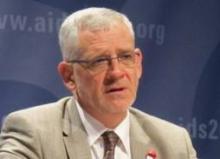WASHINGTON – A large international society of AIDS clinicians is endorsing the use of treatment as prevention and pre-exposure prophylaxis as a means of containing the epidemic.
With the two approaches gaining currency, primary care physicians and ob.gyns. will likely be called upon to deliver the therapies.
The consensus statement, issued by the International Association of Physicians in AIDS Care (IAPAC), is the end result of a gathering of experts in June.
Treatment as Prevention (TasP) gained credence after publication of the HIV Prevention Trials Network (HPTN) 052 study in the New England Journal of Medicine last August (N. Engl. J. Med. 2011;365:493-505). The trial more or less definitively proved that giving antiretroviral treatment significantly reduces the rate of sexual transmission of HIV.
Pre-Exposure Prophylaxis (PrEP) has been shown to reduce infection with the virus in heterosexuals and homosexuals who might get exposed through risky sexual activity. In July, the Food and Drug Administration approved Truvada (a drug that combines tenofovir disoproxil fumarate with emtricitabine) for use as PrEP among sexually active adults at risk for HIV infection.
"The group felt that the paradigm for using antiretroviral therapy as prevention had been established," said Dr. Kenneth Mayer, chairman of the IAPAC TasP/PrEP Advisory Committee, and medical research director at the Fenway Institute in Boston. "We know that this works. The issue now is implementation," he said in a press briefing at the 19th International AIDS Conference.
The consensus backs the idea of offering treatment to those who want to start. But, said Dr. Mayer, the question is, "How do we scale up training providers so they can do this in a competent way so we can manage people in an optimal way?"
Dr. Julio Montaner, also a member of the IAPAC TasP/PrEP Advisory Committee, said that studies in Africa had shown that therapy could be given by nonspecialists and even by nonphysicians. "It is abundantly clear that we have made treatment of HIV more complicated than it needs to be," said Dr. Montaner, director of the British Columbia Centre for Excellence in HIV/AIDS in Vancouver, B.C.
Now that regimens have become simpler, safer, and better tolerated, "I’m very optimistic that we are going to increasingly see treatment being supervised by people other than the specialists," he said. Dr. Montaner noted that in British Columbia, treatment is predominantly being initiated by family physicians.
Another key issue: For TasP to work, people need to know their HIV status. So the consensus backs higher levels of HIV testing.
Other challenges to implementing TasP include resource limitations; how to evaluate the quality of care; ethical issues; and how to monitor people for increases in risky behavior and suboptimal adherence, said Dr. Mayer.
Monitoring risky behavior will also be a challenge with PrEP, he said. There are also questions about the optimal dose and timing of the dose, he said, adding that much more research needs to be done on PrEP, relative to TasP.
PrEP is not a standalone therapy, he said. "It has to be part of a comprehensive prevention package," that includes behavioral interventions, said Dr. Mayer. And it is not meant to be a lifetime therapy. It should be used at a time of acute risk, he said, adding that PrEP is "a measure to get them through a period where they might otherwise become HIV infected."
The full consensus statement is available at the IAPAC website. It will also be shared with many physician groups, including the American College of Physicians, the American Academy of Family Practitioners, and the American Congress of Obstetricians and Gynecologists, said Dr. Mayer in an interview.



